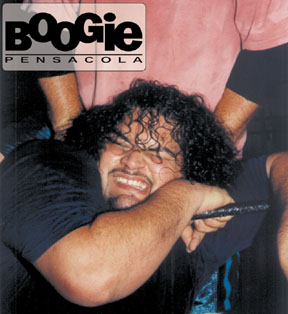
Volume 3 #6 (March 22 - April 4, 2000)
So You Wanna Be A Wrestler?
Wild Samoans Train Pros in Pensacola
BY
MIKE
ROYCROFT
Across the country, night after night, men and women seclude themselves in living rooms for the sacred ritual of eating potato chips in the Lazy Boy while watching professional wrestling. Inevitably, some beer-bellied stallion among them points to the screen and says, "That was so fake! This stuff is easy! I bet I could even do it!"
Oh yeah?
Well, if you would-be wrestlers live in the Pensacola area, you finally have the opportunity to put your money where your mouth is. The Wild Samoan Training Center opened a local chapter to give a break into the business for future mat superstars. The school was started by its namesakes, Afa and Sika, who were hugely successful as the Wild Samoans tag team in the late 1970s, both in the local wrestling territory and the big time, the World Wrestling Federation (W.W.F.). Afa has run the original school in Pennsylvania for well over a decade, and six months ago, Sika and his son Matt Anoai branched out into Pensacola.
Those who may not remember the original Wild Samoans will surely recognize their modern day equivalents. Matt's cousins include the W.W.F.'s Rikishi Fatu and the man who is no doubt the most popular entertainer in the sport today, the Rock.
Fatu and his cousin Samu first gained notoriety as W.W.F. tag champs the Headshrinkers in the 1990s, and Matt Anoai later carried the torch with Samu as the Samoan Gangstas in both the W.W.F. and Extreme Championship Wrestling (E.C.W.) as the decade went on.
Matt grew up in the business, watching his dad wrestle every Sunday at the Bayfront Auditorium back in the day, going fishing with all the other wrestlers and their sons out on the Pensacola Bay Bridge after the show. One notable fishing buddy of his youth was Bullet Bob Armstrong's son Brian, now very successful as the Road Dogg in the W.W.F. Brian's brother Scott Armstrong and Anoai's cousin the Tonga Kid started out in the local area as the tag team called the RAT Patrol.
Matt still wrestles frequently in Japan while booking various independent shows stateside, and he has relatives, friends, and connections throughout the industry.
What does the new school teach?
"How to wrestle, the psychology of wrestling," says Anoai. He takes his students right into the ring and drills them in the basic holds, lockups, and mat styles. They also learn how to conduct an interview, or as they say in the business, "cut a promo." Eventually, a student learns the high-risk aerial styles of Mexico that have become such crowd pleasers. The school not only trains wrestlers, but referees and managers as well. Anoai says he looks for students that have the right attitude, not just the loud-mouthed braggadocios attitude of the in-ring wrestler, but also a respectful attitude outside of the ring and a willingness to learn. All kinds of people have tried out at the school, ranging in ages from 13 to 45.
How much does this education cost? Based on an average term of eight months, Anoai says that the cost is $2,000. This may sound like a lot, but consider the level of experience being applied to the training, and the fact that a graduate has the impressive Samoan wrestling network already shopping him around for work in Japan, Mexico, Puerto Rico, and the Anoais' own promotion, American Pro Wrestling out of Pennsylvania.
One of the standout students of the Wild Samoan Center was Billy Kidman, who made it through the eight-month course in three months, and within a year was making two grand a week for World Championship Wrestling (W.C.W.), where he is still a regular television performer.
Is it as easy as those armchair warriors think it is?
"Most students come in for a tryout, and they don't realize there's a lot to learn, basically because they don't think it's as hard as what they see on TV," says Anoai. "When they go through the tryout, a lot of them figure out that they are physically unfit for wrestling, even though they are fit by body or looks. You can go out and run a mile a day for the rest of your life, and you still won't get as winded as you do during a match. Wrestling is a demanding sport which is hard on the body, and you really have to love it to do it. Wrestling is just like any other entertainment business; only one percent of the millions that are out there actually make good money."
Anoai was one of the few of his relatives who was not intent on becoming a wrestler from the outset. He says he was reluctant at first, but then grew to love doing it. Even the most successful wrestling life involves living out of a suitcase and getting the crap beat out of you, and then the average career is only fifteen years long at best. Is it worth it?
"Being around it my whole life and actually growing into loving this sport," he says, "I wouldn't change it for the world."
Anoai speaks not only from personal experience. He watched his cousin Fatu struggle for years in the W.W.F. with limited success, only to reach his pinnacle this past year when he became the character Rikishi.
"Everybody's had to struggle, and when you move a family all over the country, it makes it that much harder," he says. "But I can guarantee you right now that he's loving every minute of it. This is good, that he finally got his break and that he's making 'retirement' kind of money."
And how about his cousin Dwayne Johnson, better know as the Rock?
"I didn't really catch on to it until I saw him in People magazine's 50 Most Beautiful People issue," he says. "Then, I was like, 'Wow!' When the time is called for you to make it happen, you'd better make it happen. Because when it stops, it stops. So as long as you're on top, you'd better stay there."
With the Rock's autobiography recently reaching number one on the New York Times bestseller list and a recent stint as host of Saturday Night Live, Matt's cousin looks to be staying on top a while longer. Anoai also notes that while recently attending a taping of the W.W.F.'s UPN show "Smackdown" in Mobile, he watched the crowd give Rocky a standing ovation for nearly twenty minutes before he even spoke a word. These things get edited down on television, Anoai says, but when you're watching that kind of pandemonium live, it's almost scary the kind of power he has over a crowd.
If you think you've got what it takes, "Just call me up at 458-9338 and we'll schedule a tryout," says Anoai, whose easygoing, friendly manner belies his 6' 5", 400 lb frame. The school also has a website at
www.wildsamoan.com.
| 


